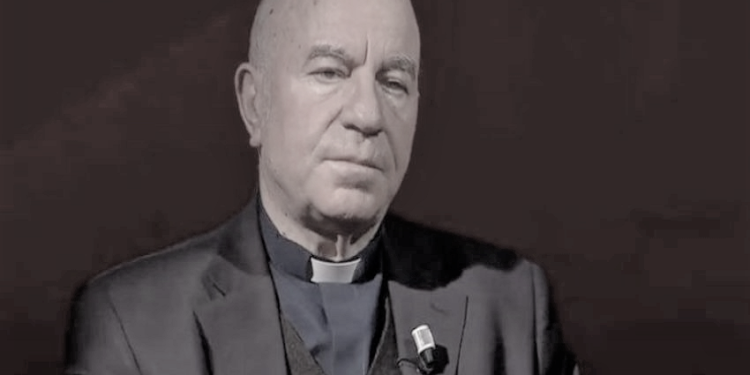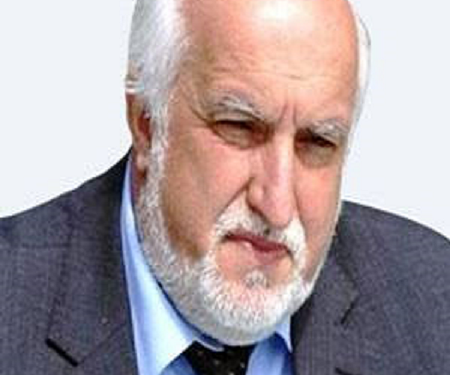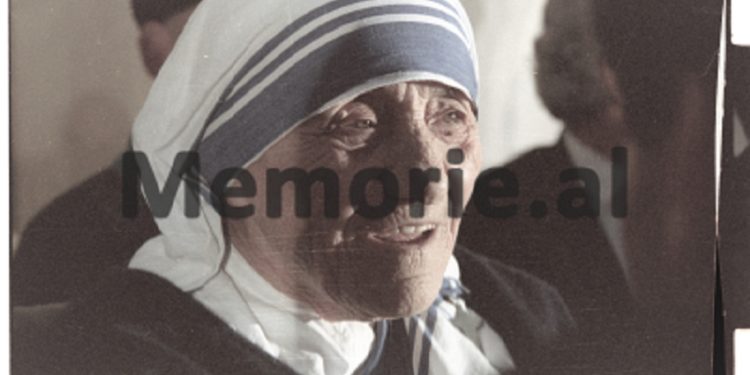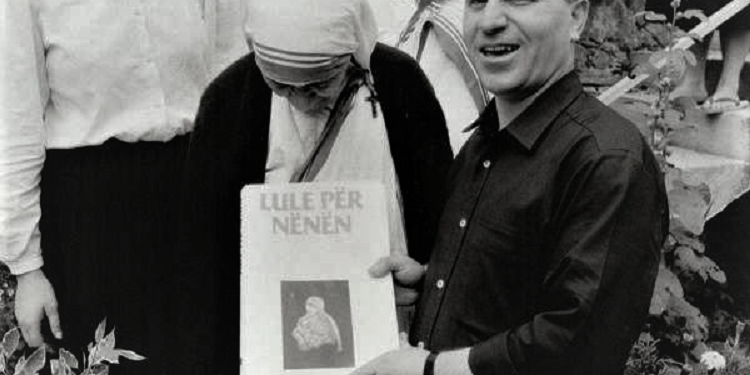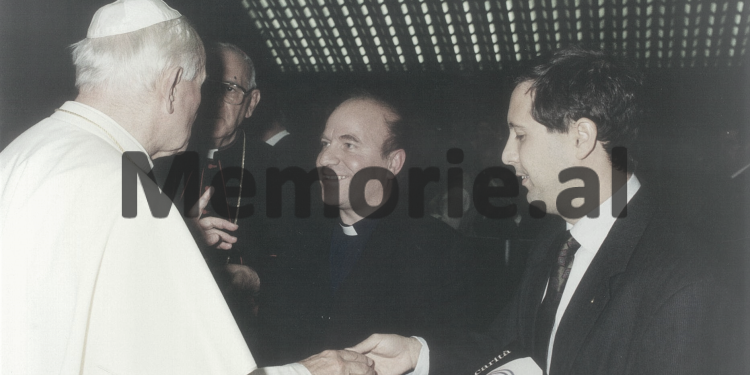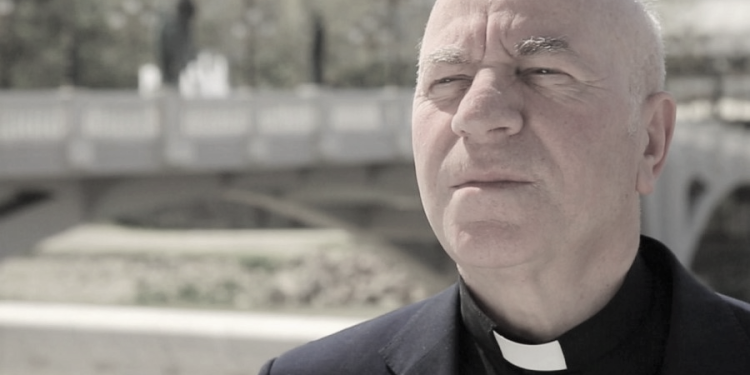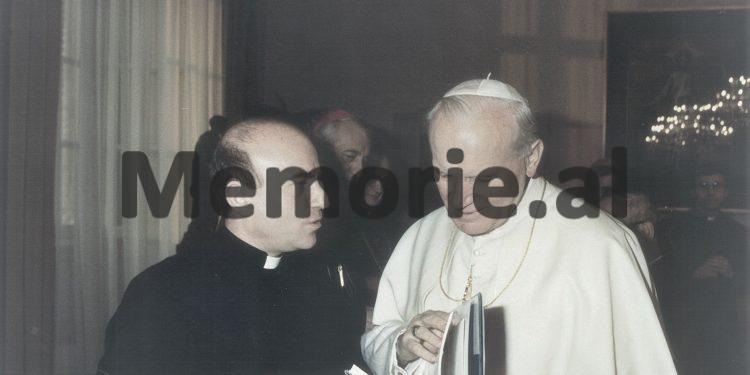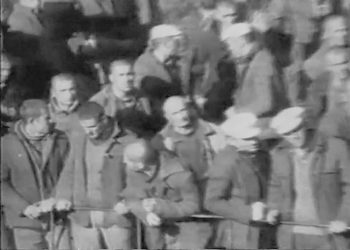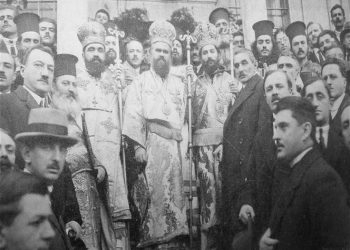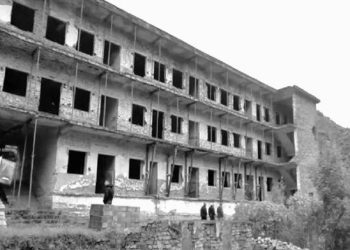By Emin AZEMI
Memorie.al/ In 1979, Mother Teresa was awarded the Nobel Peace Prize. In memory and honor of this major event, Monsignor Don Lush Gjergji, had published the book “I have in my heart my Albanian people”, the 17th in a row. When this book came out (2019), the author had mentioned three reasons that pushed him to write and publish that book: The Night of Gonxhe Bojaxhiu’s birthday, the 40th anniversary of the Nobel Peace Prize, and a personal jubilee of his – 50th anniversary of the first meeting with Mother Teresa in Rome, on March 29, 1969.
The special thing about this book is that it includes Mother Teresa’s speech on the occasion of receiving the ‘Nobel Peace Prize’, while Don Lush Gjergji himself, although he had followed step by step the activity of Mother Teresa, admits that he does not he is not even sure if he knows Mother Teresa well!
“Even after all these years, I’m not sure I know him well, that I understand him and, above all, that I may be able to pass it on to others through writing and testimony.” But we are all sure of one thing: In an interview in Oslo, Norway, in 1979, Mother Teresa made it clear who she was: “My origin is Albanian. My citizenship is Indian. I am Catholic, consecrated nun. “By my calling, I belong to the whole world.”
Those who had heard Mother Teresa’s interview for the first time were amazed. “Many people until then thought that Mother Teresa is from India, but from that day, everything changed”, Don Lush Gjergji will declare later, in communication with journalists.
Mother Teresa, for her spiritual values that transcend the usual dimensions of human devotion, was canonized on September 5, 2016, by the Holy See in the Vatican, 19 years after her death.
In this book, in addition to the seven interviews conducted by the author, are included other articles in the form of reports that deal with: The five visits of Mother Teresa in Kosovo and a chronicle of memories of Don Lush Gjergji, with a common title: Mother My Teresa, where some personal experiences are presented, some details, which as the author says: “are sealed in my heart and in my mind”.
In this part are given some reminiscences of authentic memories of Don Lush Gjergji, during the contacts and conversations he had with Mother Teresa.
It is worth mentioning a detail related to the days of stay in Oslo, in which case Mother Teresa, after being invited to the solemn dinner by the ‘Nobel’ Committee, as Don Lush Gjergji writes in his book, had rejected him on the grounds: “I cannot accept such a dinner, as long as our people suffer and die of hunger … we want to be poor, as they are …”!
The money that would have been spent on dinner was given to Mother Teresa for the poor. Don Lush Gjergji first met Mother Teresa in Rome, in 1969, and since that meeting, as he himself says; he has tried to follow her faithfully, through the streets of the world, to enrich him with experiences of her life. Meanwhile, in terms of experiences, we will see that in the interviews conducted with Mother Teresa, the depth of her character and the sensitivity to create great causes from small things will be best revealed.
Don Lush Gjergji has managed to turn the conversation with Mother Teresa into a spiritual radiograph, with vast spaces of a gigantic human nature which, as it captured the harmonious dimensions between the Divine and the Earthly, found the right power to stated that: “The most serious disease is neither scabies nor cancer, but loneliness; to be ignored and forgotten by all. Those people, who do not have love, joy, human contact, suffer a lot. However, the number of these people is always increasing “.
This is how Mother Teresa answered a question from Don Lush Gjergji, what is the most serious disease in the world in her opinion. Being a meticulous recorder of all the movements and activities that Mother Teresa had developed, Don Lush Gjergji admits that every meeting with her was something new, a deep experience, a challenge, a desire to be different. And to be as convincing as possible in front of a wider audience, the author had chosen the interview as the most appropriate means to reveal the complexity and plasticity of the figure of Mother Teresa, which through these five interviews, comes out somewhat closer to us. as perception and as experience.
All interviews have their thematic and content axis and in each of them the reader can find messages and wise thoughts of Mother Teresa, which constitute the unique system of her thought. Fortunately, a part of this system also comes in this book, because as Don Lush Gjergji wrote in the preface of this book, in all the meetings there were pleasant and useful conversations, friendly with Mother Teresa, some of which he suggests to readers to read, so that they can better understand it, follow it in its spiritual walk, try to imitate it, at least to some extent, in our daily life, since only in this way it it can be a crucial impetus for our faith, our love for God, and our neighbor.
In the general perception, the figure of the Mother emerges as a human profile dominated by the cosmopolitan dimension, as a figure who has detached himself from the trunk of origin and the weight of human weight had unloaded the abandoned streets of India and the lonely corners of the world, while there is another perception, especially of those who have known closely and very well her human nature, which includes Don Lush Gjergji, where the figure of Mother Teresa appears to us with another dimension, with a spirit that corresponded with her unquenchable love for family but also for country of origin.
To prove this, it is enough to read the interview entitled: “The long-standing desire to return to my Albanian people”, realized in 1978, during a visit of Mother Teresa in Skopje, where Don Lush Gjergji, in a warm conversation reveals, its sides less known to the general public.
Asked how she felt in her hometown of Skopje, after so many years of absence, Mother Teresa answers with nostalgia and despair: “I think especially of my family, of my late father, Kola, and of my mother, Drane, who now lives with my sister Age in Tirana and my brother Lazri, who lives in Palermo. I have often met my brother, either in Rome or in Palermo, since there we have a home for the elderly and the poor. I have not seen my mother and sister since 1928, since my departure for missions in Zagreb… ”!
From these words that come from the depths of the heart, Mother Teresa testifies that throughout her life journey, she had carried with her the weight of her family saga and had tried to preserve the memory of home, the table, in a corner of her heart. , her family and her motorcycles, with whom she had shared moments of joy in the former Skopje of glory and pride, but also of despair and sadness.
The book “I have my Albanian people in my heart”, is also a source of references for all those who want to complete and systematize the knowledge on the completeness of the figure of Mother Teresa, but also a connection with the rich world of a woman who planted in our minds and hearts the seed of love for God and man.
With this book, Don Lush Gjergji has enriched not only libraries, but also our research horizon behind the model of a personality like Mother Teresa, who continues to inspire us with the power of her human and spiritual radiation. Memorie.al
Skopje, 14 June 2022




